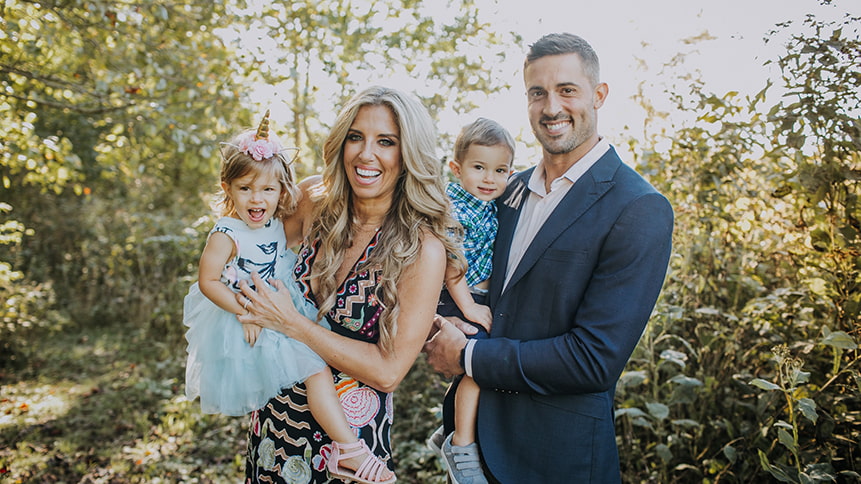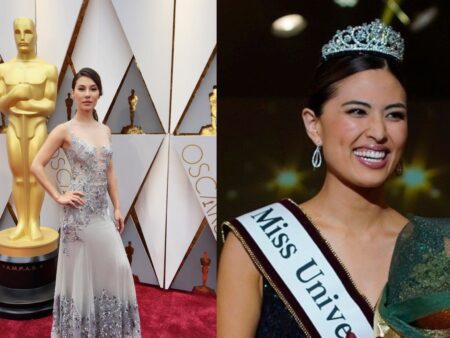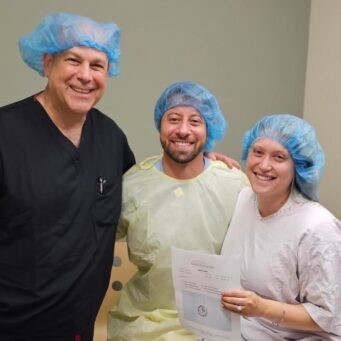
You may recognize sportscaster Sara Walsh from her years as an anchor on ESPN’s SportsCenter, or more recently as a host on Fox Sports. What you may not know is that Sara and her husband, former Arizona Diamondbacks pitcher Matt Buschmann, struggled to start their family for years. Between pregnancy losses and failed treatments, the two were thrilled to welcome twin babies, via IVF, in February 2017. Here’s their family story:
Q: How did you meet your husband? Did you always know you wanted to have kids together?
I originally met Matt when I was a sports reporter in Nashville and he was playing baseball for Vanderbilt University. I had to interview him for a story, a meeting we still actually have on tape. Six years later, I was hosting SportsCenter, doing an interview with a former Vandy teammate of his from those days, and he brought Matt’s name up. We got reconnected through his teammate and the rest is history. I had been so focused on my career, having kids wasn’t really on my radar. But once I met Matt, my mindset completely changed, and having children mattered to me in a way it never had before.
Q: What’s your fertility/infertility story, in a nutshell?
I was 36 when I first got pregnant. I had concerns about my age, but every day we’re inundated with success stories of people my age or older who seemingly have no issues having a baby. People told me it would be simple. It wasn’t. We lost that baby. People would tell me how common it was to have a miscarriage. They’d say that it happened to them, and they were fine the next time around. I wasn’t fine. I lost the next baby. We went down the road of IUI and lost another baby. Clearly I could get pregnant, but I had sadly learned that that didn’t mean I could have a baby. At this point we knew we needed to genetically test the eggs because something was wrong.
People would tell me how common it was to have a miscarriage, that it happened to them and they were fine the next time around. I wasn’t. I lost the next baby.
During IVF we learned there really weren’t many eggs to work with. We could only come up with two eggs after multiple cycles, some of which were cancelled in the middle of the process because it just wouldn’t work. After accepting we couldn’t do much more in terms of retrieving eggs we decided to take our last shot and transfer the only two embryos that we had frozen. After a long road, filled with plenty of devastating news, we finally had something to celebrate. We had twins.
After having the twins, I got pregnant one more time without medical help, but again we would lose that baby. We realize that despite the many losses, we are incredibly fortunate to have what we do.
Q: Can you describe being on air, and broadcasting during Mother’s Day, after experiencing losses? What do you wish people knew then about what you were going through?
The first time I realized I was having a miscarriage I was actually on-air and far from home. I was in Alabama hosting SportsCenter on the road in front of a huge crowd of screaming college kids. I knew I needed to get to a hospital, but I was scared and I didn’t feel there was anyone on set I could tell. I worked with all guys, in a male-dominated industry. My mindset at the time was I didn’t want to be known as someone who was bringing their “female problems” to work. Every commercial break my husband was texting me hospital options in Alabama, trying to logistically coordinate medical help while being more than a thousand miles away, helplessly watching this unfold on television. It was just the beginning of what would become a nightmare couple of years for us…
I don’t believe anyone watching that day would have had any idea what was going on. I prided myself in putting my job first. And looking back, I was wrong in doing that. If you’re having a serious medical problem, you should speak up, no matter how worried you are about the consequences at work. I realize now having a miscarriage isn’t a female problem – it’s a human problem. It affects far more people that any of us think, and it affects the men we know because they are husbands and fathers and brothers and friends.
The first time I realized I was having a miscarriage I was actually on-air and far from home. I was in Alabama hosting SportsCenter on the road in front of a huge crowd of screaming college kids. I knew I needed to get to a hospital, but I was scared and I didn’t feel there was anyone on set I could tell. I worked with all guys, in a male-dominated industry.
I was always anchoring on Mother’s Day, and year after year I would be standing there knowing a due date had come and gone with nothing to celebrate. I felt like I had let Matt down, and then I’d stand there and do a show, talk to athletes about what it meant to be a mom, while feeling like a failure. It was just a blatant reminder of all that had gone wrong.
Q: What do you wish people knew about what you were going through then?
I wish people knew how hard I worked just to be at work. Keeping it together professionally while everything fell apart personally was the toughest part of my journey.
I hid appointments, pregnancies, miscarriages and surgeries. I’d have surgery one day, the doctor would tell me to be out of work for a week, and I’d go back on air the next morning. Nobody knew. One day on SportsCenter I got a text completely out of the blue from a friend that said, “When are you going to have a baby?” I had lost a baby that week. I plastered a smile on my face and kept doing the show, trying to blink back tears. At my lowest, I thought about suicide more often than I want to admit. I clung to the idea that I was fooling people and seemed fine. I wasn’t. Every single day was a struggle.
Q: How did you keep faith or hope to keep going, despite so many losses and setbacks?
With twins here now, it’s so easy to say I just kept the faith. That’d be a lie. I had lost hope many times throughout the journey. When you’ve gotten nothing but bad news at every turn, it’s really hard to believe the good news. My husband, and my brilliant IVF doctor (Dr. Ryan Martin of Shady Grove Fertility in Philadelphia) are the ones who never lost faith, who believed it would work out long after I had given up. Looking back now, I wish I had let more people in. The situation is really hard, and I made it significantly more taxing trying to hide everything, worried about what others would think. When you lose hope, surround yourself with people who never will.
Q: Anything else you want to add for those reading who are feeling overwhelmed or hopeless as they try to build their families?
You are not alone. If you need help – from a friend, a coworker, a boss – ask for it. I didn’t. But I know now that people genuinely want to help one another.
Fertility struggles are a sensitive topic, but more often than we know, the person next to you could be going through the very same thing. You don’t have to fight your battles alone. I thought I did. It wasn’t until after I had the twins that I finally went public with my experience. I was completely blown away by the number of people that reached out and said, “If we’d only known….” Or “This happened to me…” People can’t help you if they don’t know you need help.
They say it takes a village to raise a child. Sometimes it takes a village to have a child. If you need to vent, if you have questions, if I can help in any way, I’ll be part of your village. Contact pregnantish if you want to connect.

Listen to stories, share your own, and get feedback from the community.


















